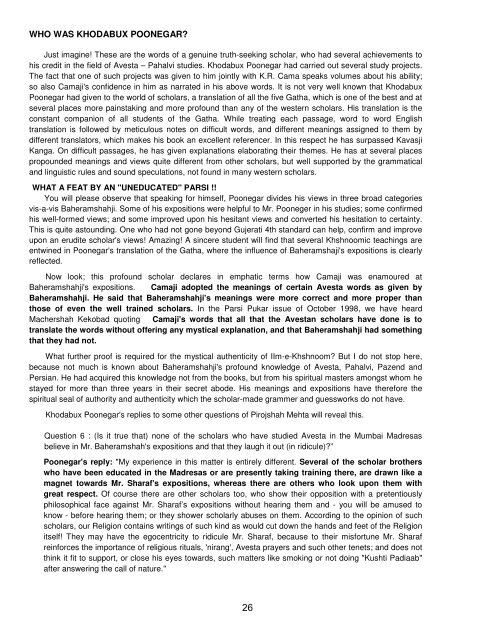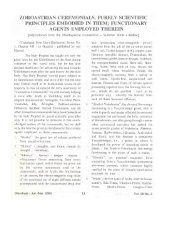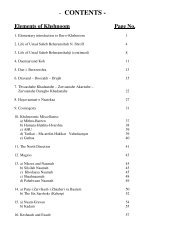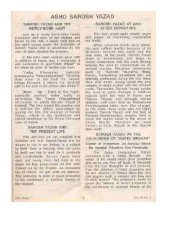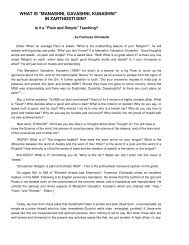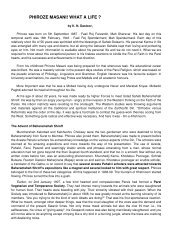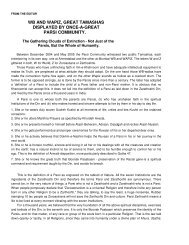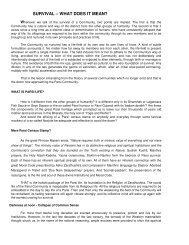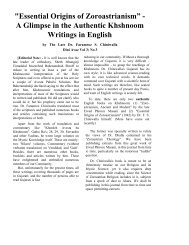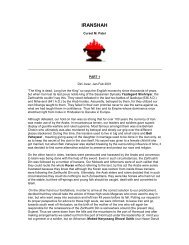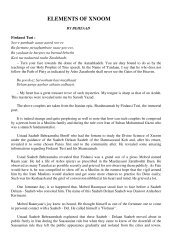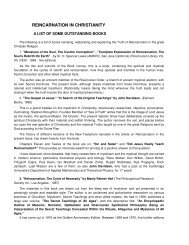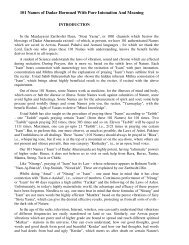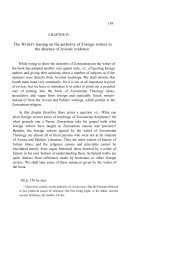Ilm-e-Khshnoom - Traditional Zoroastrianism: Tenets of the Religion
Ilm-e-Khshnoom - Traditional Zoroastrianism: Tenets of the Religion
Ilm-e-Khshnoom - Traditional Zoroastrianism: Tenets of the Religion
You also want an ePaper? Increase the reach of your titles
YUMPU automatically turns print PDFs into web optimized ePapers that Google loves.
WHO WAS KHODABUX POONEGAR?<br />
Just imagine! These are <strong>the</strong> words <strong>of</strong> a genuine truth-seeking scholar, who had several achievements to<br />
his credit in <strong>the</strong> field <strong>of</strong> Avesta – Pahalvi studies. Khodabux Poonegar had carried out several study projects.<br />
The fact that one <strong>of</strong> such projects was given to him jointly with K.R. Cama speaks volumes about his ability;<br />
so also Camaji's confidence in him as narrated in his above words. It is not very well known that Khodabux<br />
Poonegar had given to <strong>the</strong> world <strong>of</strong> scholars, a translation <strong>of</strong> all <strong>the</strong> five Gatha, which is one <strong>of</strong> <strong>the</strong> best and at<br />
several places more painstaking and more pr<strong>of</strong>ound than any <strong>of</strong> <strong>the</strong> western scholars. His translation is <strong>the</strong><br />
constant companion <strong>of</strong> all students <strong>of</strong> <strong>the</strong> Gatha. While treating each passage, word to word English<br />
translation is followed by meticulous notes on difficult words, and different meanings assigned to <strong>the</strong>m by<br />
different translators, which makes his book an excellent referencer. In this respect he has surpassed Kavasji<br />
Kanga. On difficult passages, he has given explanations elaborating <strong>the</strong>ir <strong>the</strong>mes. He has at several places<br />
propounded meanings and views quite different from o<strong>the</strong>r scholars, but well supported by <strong>the</strong> grammatical<br />
and linguistic rules and sound speculations, not found in many western scholars.<br />
WHAT A FEAT BY AN "UNEDUCATED" PARSI !!<br />
You will please observe that speaking for himself, Poonegar divides his views in three broad categories<br />
vis-a-vis Baheramshahji. Some <strong>of</strong> his expositions were helpful to Mr. Pooneger in his studies; some confirmed<br />
his well-formed views; and some improved upon his hesitant views and converted his hesitation to certainty.<br />
This is quite astounding. One who had not gone beyond Gujerati 4th standard can help, confirm and improve<br />
upon an erudite scholar's views! Amazing! A sincere student will find that several <strong>Khshnoom</strong>ic teachings are<br />
entwined in Poonegar's translation <strong>of</strong> <strong>the</strong> Gatha, where <strong>the</strong> influence <strong>of</strong> Baheramshaji's expositions is clearly<br />
reflected.<br />
Now look; this pr<strong>of</strong>ound scholar declares in emphatic terms how Camaji was enamoured at<br />
Baheramshahji's expositions. Camaji adopted <strong>the</strong> meanings <strong>of</strong> certain Avesta words as given by<br />
Baheramshahji. He said that Baheramshahji's meanings were more correct and more proper than<br />
those <strong>of</strong> even <strong>the</strong> well trained scholars. In <strong>the</strong> Parsi Pukar issue <strong>of</strong> October 1998, we have heard<br />
Machershah Kekobad quoting Camaji's words that all that <strong>the</strong> Avestan scholars have done is to<br />
translate <strong>the</strong> words without <strong>of</strong>fering any mystical explanation, and that Baheramshahji had something<br />
that <strong>the</strong>y had not.<br />
What fur<strong>the</strong>r pro<strong>of</strong> is required for <strong>the</strong> mystical au<strong>the</strong>nticity <strong>of</strong> IIm-e-<strong>Khshnoom</strong>? But I do not stop here,<br />
because not much is known about Baheramshahji's pr<strong>of</strong>ound knowledge <strong>of</strong> Avesta, Pahalvi, Pazend and<br />
Persian. He had acquired this knowledge not from <strong>the</strong> books, but from his spiritual masters amongst whom he<br />
stayed for more than three years in <strong>the</strong>ir secret abode. His meanings and expositions have <strong>the</strong>refore <strong>the</strong><br />
spiritual seal <strong>of</strong> authority and au<strong>the</strong>nticity which <strong>the</strong> scholar-made grammer and guessworks do not have.<br />
Khodabux Poonegar's replies to some o<strong>the</strong>r questions <strong>of</strong> Pirojshah Mehta will reveal this.<br />
Question 6 : (Is it true that) none <strong>of</strong> <strong>the</strong> scholars who have studied Avesta in <strong>the</strong> Mumbai Madresas<br />
believe in Mr. Baheramshah's expositions and that <strong>the</strong>y laugh it out (in ridicule)?”<br />
Poonegar's reply: "My experience in this matter is entirely different. Several <strong>of</strong> <strong>the</strong> scholar bro<strong>the</strong>rs<br />
who have been educated in <strong>the</strong> Madresas or are presently taking training <strong>the</strong>re, are drawn like a<br />
magnet towards Mr. Sharaf's expositions, whereas <strong>the</strong>re are o<strong>the</strong>rs who look upon <strong>the</strong>m with<br />
great respect. Of course <strong>the</strong>re are o<strong>the</strong>r scholars too, who show <strong>the</strong>ir opposition with a pretentiously<br />
philosophical face against Mr. Sharaf’s expositions without hearing <strong>the</strong>m and - you will be amused to<br />
know - before hearing <strong>the</strong>m; or <strong>the</strong>y shower scholarly abuses on <strong>the</strong>m. According to <strong>the</strong> opinion <strong>of</strong> such<br />
scholars, our <strong>Religion</strong> contains writings <strong>of</strong> such kind as would cut down <strong>the</strong> hands and feet <strong>of</strong> <strong>the</strong> <strong>Religion</strong><br />
itself! They may have <strong>the</strong> egocentricity to ridicule Mr. Sharaf, because to <strong>the</strong>ir misfortune Mr. Sharaf<br />
reinforces <strong>the</strong> importance <strong>of</strong> religious rituals, 'nirang', Avesta prayers and such o<strong>the</strong>r tenets; and does not<br />
think it fit to support, or close his eyes towards, such matters like smoking or not doing "Kushti Padiaab"<br />
after answering <strong>the</strong> call <strong>of</strong> nature."<br />
26


